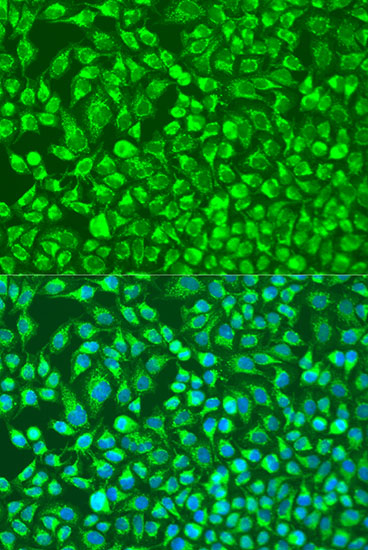Anti-MMP14 Antibody (CAB15691)
- SKU:
- CAB15691
- Product type:
- Antibody
- Reactivity:
- Human
- Host Species:
- Rabbit
- Isotype:
- IgG
- Antibody Type:
- Polyclonal Antibody
- Research Area:
- Cell Biology
Description
| 抗体名: | Anti-MMP14 Antibody |
| 抗体コード: | CAB15691 |
| 抗体サイズ: | 20uL, 50uL, 100uL |
| 申し込み: | IF |
| 反応性: | Human |
| 宿主種: | Rabbit |
| 免疫原: | A synthetic peptide of human MMP14 |
| 申し込み: | IF |
| 推奨希釈: | IF 1:50 - 1:200 |
| 反応性: | Human |
| ポジティブサンプル: |
| 免疫原: | A synthetic peptide of human MMP14 |
| 精製方法: | Affinity purification |
| ストレージバッファ: | Store at -20'C. Avoid freeze / thaw cycles. Buffer: PBS with 0.02% sodium azide, 50% glycerol, pH7.3. |
| アイソタイプ: | IgG |
| 順序: | Email for sequence |
| 遺伝子ID: | 4323 |
| Uniprot: | P50281 |
| セルラーロケーション: | Cytoplasm, Melanosome, Membrane, Single-pass type I membrane protein |
| 計算された分子量: | 65kDa |
| 観察された分子量: |
| 同義語: | MMP14, MMP-14, MMP-X1, MT-MMP, MT-MMP 1, MT1-MMP, MT1MMP, MTMMP1, WNCHRS, MT-MMP1 |
| バックグラウンド: | Proteins of the matrix metalloproteinase (MMP) family are involved in the breakdown of extracellular matrix in normal physiological processes, such as embryonic development, reproduction, and tissue remodeling, as well as in disease processes, such as arthritis and metastasis. Most MMP's are secreted as inactive proproteins which are activated when cleaved by extracellular proteinases. However, the protein encoded by this gene is a member of the membrane-type MMP (MT-MMP) subfamily; each member of this subfamily contains a potential transmembrane domain suggesting that these proteins are expressed at the cell surface rather than secreted. This protein activates MMP2 protein, and this activity may be involved in tumor invasion. |
| UniProt Protein Function: | MMP14: Seems to specifically activate progelatinase A. May thus trigger invasion by tumor cells by activating progelatinase A on the tumor cell surface. May be involved in actin cytoskeleton reorganization by cleaving PTK7. Up-regulated by NANOS1. Expressed in stromal cells of colon, breast, and head and neck. Expressed in lung tumors. Belongs to the peptidase M10A family. |
| UniProt Protein Details: | Protein type:EC 3.4.24.80; Protease; Motility/polarity/chemotaxis; Membrane protein, integral Chromosomal Location of Human Ortholog: 14q11.2 Cellular Component: extracellular matrix; focal adhesion; Golgi lumen; integral to plasma membrane; cytoplasm; melanosome; plasma membrane Molecular Function:integrin binding; protein binding; protease activator activity; zinc ion binding; metalloendopeptidase activity; calcium ion binding; transcription factor activity Biological Process: extracellular matrix organization and biogenesis; tissue remodeling; negative regulation of focal adhesion formation; male gonad development; embryonic cranial skeleton morphogenesis; proteolysis; positive regulation of cell growth; collagen catabolic process; extracellular matrix disassembly; regulation of transcription, DNA-dependent; branching morphogenesis of a tube; ovarian follicle development; response to estrogen stimulus; response to mechanical stimulus; endothelial cell proliferation; response to hypoxia; zymogen activation; response to oxidative stress; angiogenesis; astrocyte cell migration; lung development; positive regulation of cell migration; endochondral ossification Disease: Winchester Syndrome |
| NCBI Summary: | Proteins of the matrix metalloproteinase (MMP) family are involved in the breakdown of extracellular matrix in normal physiological processes, such as embryonic development, reproduction, and tissue remodeling, as well as in disease processes, such as arthritis and metastasis. Most MMP's are secreted as inactive proproteins which are activated when cleaved by extracellular proteinases. However, the protein encoded by this gene is a member of the membrane-type MMP (MT-MMP) subfamily; each member of this subfamily contains a potential transmembrane domain suggesting that these proteins are expressed at the cell surface rather than secreted. This protein activates MMP2 protein, and this activity may be involved in tumor invasion. [provided by RefSeq, Jul 2008] |
| UniProt Code: | P50281 |
| NCBI GenInfo Identifier: | 317373419 |
| NCBI Gene ID: | 4323 |
| NCBI Accession: | P50281.3 |
| UniProt Secondary Accession: | P50281,Q6GSF3, Q92678, A8K5L0, |
| UniProt Related Accession: | P50281 |
| Molecular Weight: | 65,894 Da |
| NCBI Full Name: | Matrix metalloproteinase-14 |
| NCBI Synonym Full Names: | matrix metallopeptidase 14 (membrane-inserted) |
| NCBI Official Symbol: | MMP14 |
| NCBI Official Synonym Symbols: | MMP-14; MMP-X1; MT-MMP; MT1MMP; MTMMP1; WNCHRS; MT1-MMP; MT-MMP 1 |
| NCBI Protein Information: | matrix metalloproteinase-14; membrane type 1 metalloprotease; membrane-type-1 matrix metalloproteinase |
| UniProt Protein Name: | Matrix metalloproteinase-14 |
| UniProt Synonym Protein Names: | MMP-X1; Membrane-type matrix metalloproteinase 1; MT-MMP 1; MTMMP1; Membrane-type-1 matrix metalloproteinase; MT1-MMP; MT1MMP |
| Protein Family: | Matrix metalloproteinase |
| UniProt Gene Name: | MMP14 |
| UniProt Entry Name: | MMP14_HUMAN |
 | Immunofluorescence analysis of U2OS cells using MMP14 antibody (CAB15691) at dilution of 1:100. Blue: DAPI for nuclear staining. |

